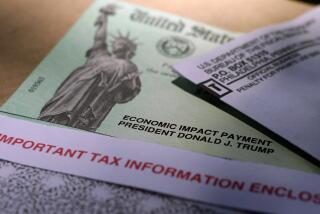Lawmakers Seek to Bar Unsolicited Loans
- Share via
WASHINGTON — One type of check in the mail--a check from a bank for an unsolicited loan--would be banned under legislation proposed Wednesday by a House lawmaker.
Rep. Maurice Hinchey (D-N.Y.) said he took the action after investigating a complaint from one of his constituents that she had received in the mail, unsolicited, a $7,500 check that turned out to be a bank loan.
If the checks are endorsed, such loans carry interest rates of as high as 20%, said Hinchey, a member of the House Banking Committee.
“Some banks are preying on consumers and jeopardizing their financial security,” he said in a statement. “Banks should not be sending unsolicited loans through the mail where anyone can get their hands on them. Even if the loan check reaches its target, a trusting individual could sign it and wind up liable for an exorbitant amount.”
Rep. Henry B. Gonzalez of Texas, the Banking Committee’s senior Democrat, is co-sponsoring the Unsolicited Loan Consumer Protection Act of 1997 with Hinchey.
Representatives for the American Bankers Assn. could not be reached for comment.
With credit-card debt and personal bankruptcies both skyrocketing, lawmakers have begun concentrating more attention on consumer lending issues. Last week, Rep. Joe Kennedy (D-Mass.) introduced a bill to limit certain fees charged by credit-card companies.
The Hinchey-Gonzalez bill would amend the Truth in Lending Act to prohibit any creditor from sending a check or other negotiable financial instrument through the mail unless a consumer had applied for or requested such a loan.
The bill also would insulate consumers from fraudulent loans. The creditor would bear the burden of proof if a consumer denied having cashed the loan check.
A subcommittee of the House Banking Committee is expected to hold hearings later in the summer on the proposal, congressional staffers said.
More to Read
Get the L.A. Times Politics newsletter
Deeply reported insights into legislation, politics and policy from Sacramento, Washington and beyond. In your inbox twice per week.
You may occasionally receive promotional content from the Los Angeles Times.










